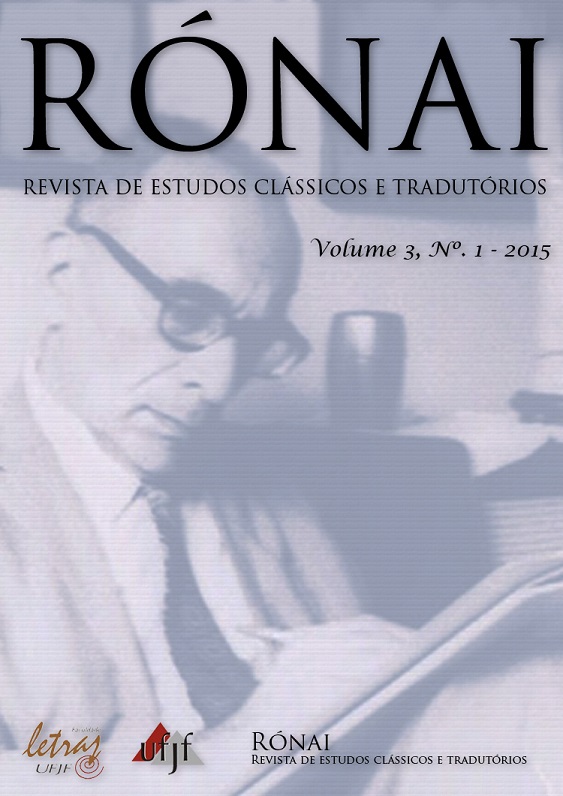Wrath and clemency: the ambiguities of Augustus's image in Ovid's Tristia
Keywords:
Augustus, Tristia, Ovid, Dialogus de oratoribus, ambivalencyAbstract
Este trabalho investiga a figura de Augusto em algumas elegias dos Tristia de Ovídio, com base na identificação de ambiguidades em sua imagem. Pretende-se analisar até que ponto tais ambiguidades revelam relações também ambíguas entre o eu-poético e o imperador – por um lado, adulação e elogio, por outro, uma crítica irônica – e como isso se associa a uma espécie de retorização da literatura, discutida por Tácito no Dialogus de oratoribus. Para tal, serão abordados dois aspectos da representação de Augusto na obra: sua assimilação a Júpiter e os elementos de Roma apresentados como símbolos do imperador.
Downloads
References
ANDRÉ, J. Introduction. In: OVIDE. Tristes. Texte établi et traduit par Jacques André.Paris: Les Belles Lettres, 2008 [1968]. p. VII-LII.
BARCHIESI, A. The poet and the prince: Ovid and Augustan discourse. Trans. Regents of the University of California. Berkeley, Los Angeles and London: University of California Press, 1997.
CARRARA, D. P. In non credendos modos: recursos retóricos e dissimulação no Livro II dos Tristia. 93f. Dissertação (Mestrado em Estudos Literários) – Programa de PósGraduação em Estudos Literários, Universidade Federal de Minas Gerais. Belo Horizonte, 2005.
DIMUNDO, R. I luoghi della cattura d’amore: a spasso con Ovidio tra portici, teatri e fori romani. In: PIMENTEL, C.; BRANDÃO, J. L.; FEDELI, P. (coord.). O poeta e a cidade no mundo romano. Coimbra: Centro de Estudos Clássicos e Humanísticos da Universidade de Coimbra, 2012. p. 83-103.
GALE, M. R. Virgil on the nature of things: the “Georgics”, Lucretius and the didactic tradition. Cambridge: Cambridge University Press, 2000.
GOELZER, H. Notice. In: TACITE. Dialogue des orateurs. Texte établi par Henri Goelzer et traduit par Henri Bornecque. Paris: Les Belles Lettres, 1960. p. 3-21.
LABATE, M. L’arte di farsi amare. Modelli culturali e progetto didascalico nell’elegia ovidiana. Pisa: Giardini Editori, 1984.
LENAZ, L. Introduzione. In: TÁCITO. Dialogo sull’Oratoria. Introduzione e commento di Luciano Lenaz, traduzione di Felice Dessì. Milano: BUR, 1996. p. 5-29.
OVIDE. L'art d'aimer. Texte établi et traduit par H. Bornecque. Paris: Les Belles Lettres, 1951.
OVIDE. Tristes. Texte établi et traduit par J. André. Paris: Les Belles Lettres, 2008.
PRATA, P. Tristes II de Ovídio: um pedido a Augusto. Aisthe: Revista de Estética, Rio de Janeiro, v. 3, n. 4, p. 38-53, 2009.
PRATA, P. O caráter intertextual dos Tristes: uma leitura dos elementos épicos virgilianos. 421f. Tese (Doutorado em Linguística) – Programa de Pós-Graduação em Linguística, Universidade Estadual de Campinas. Campinas, 2007.
SUETÔNIO & AUGUSTO. A vida e os feitos do divino Augusto. Trad. de Matheus Trevizam, Paulo Sérgio Vasconcellos, Antônio Martinez de Rezende. Belo Horizonte: Editora UFMG, 2007.
TÁCITO. Diálogo dos oradores. Trad. de Antônio Martinez de Rezende e Júlia Batista Castilho de Avellar. Belo Horizonte: Autêntica Editora, 2014.
VIDEAU-DELIBES, A. Les Tristes d’Ovide et l’élégie romaine: une poétique de la rupture. Paris: Klincksieck, 1991.
VIRGÍLIO. Geórgicas I. Organização e tradução de Matheus Trevizam. Belo Horizonte: Editora UFMG, 2013.
VIRGILE. Géorgiques. Texte établi et traduit par Saint-Denis. Paris: Les Belles Lettres, 1956.
VOLK, K. Ovid. West Sussex: Wiley-Blackwell, 2010.
WILLIAMS, G. Banished voices: readings in Ovid’s exile poetry. Cambridge: University Press, 2007.
WHEELER, A. L. Introduction. In: OVID. Tristia & Ex Ponto. Translated by A. L. Wheeler. London and Cambridge: Loeb Classical Library, 1996 [1924]. p. VII-XXXVIII.
Downloads
Published
How to Cite
Issue
Section
License
Copyright (c) 2015 Rónai – Revista de Estudos Clássicos e Tradutórios

This work is licensed under a Creative Commons Attribution 4.0 International License.
Copyright
The authors of the published contributions agree with the following items:
1. The authors keep the copyright and convey to the journal the right of first publication, the work being licensed under a Creative Commons Attribution License 4.0 International.
2. The authors are allowed and stimulated to publicize and distribute their work online after the publication in the journal, recognizing first publication in this journal.
3. The authors of the approved works authorize the journal to distribute their content, after publication, for reproduction in content indexes, virtual libraries and similars.
For more information about Creative Commons Attribution License 4.0 International, please, go to: https://creativecommons.org/licenses/by/4.0/deed.en
Editorial exemption
The authors of the published contributions are entirely and exclusively responsible for their contents. Its content does not represent an official position of Rónai - Revista de Estudos Clássicos e Tradutórios neither of Faculdade de Letras da Universidade Federal de Juiz de Fora or their partner institutions.



